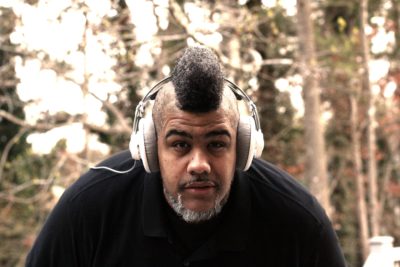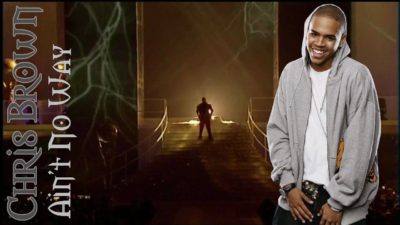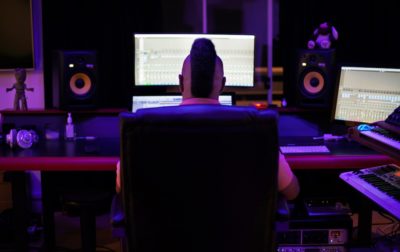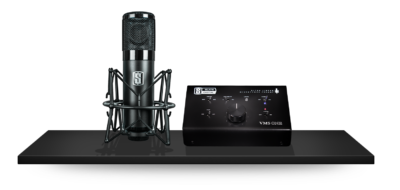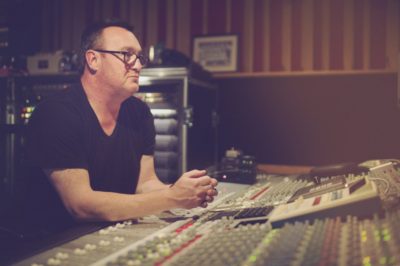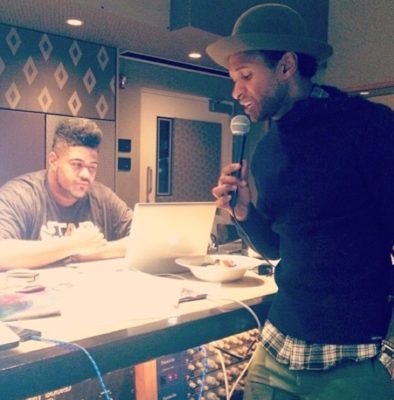Oak Felder on Picking Mix Engineers and Going Platinum by Accident
How many hits and hit artists has producer Oak Felder been behind? How much time do you have?
Writing down the whole platinum discography for this two-time GRAMMY winner – a Turkish expatriate who came to the US in 2001 with no plans for being a music producer – would eat up so much space that we’d never get to his essential insights below. But here’s a taste:
Demi Lovato (“Sorry Not Sorry”), Kehlani (“Distraction”), Alessia Cara (“Here”, “Scars To Your Beautiful”, “How Far I’ll Go”), Nikki Minaj (“Your Love”), Wiz Khalifa and Big Sean (“Marvin and Chardonnay”) Ariana Grande, Britney Spears, Miguel, Jessie J, Kelly Clarkson, and Jason Derulo. Those two GRAMMY Awards came in 2014 for his work on Alicia Keys’ Girl on Fire (“Best R&B Album”) and Rihanna’s Unapologetic (“Best Urban Contemporary Album”) plus a nomination for Usher’s “Good Kisser” (“Best R&B Song”). He took home honors as “Top Producer” at the 2013 BMI R&B/Hip-Hop Awards, alongside his partner Andrew “Pop” Wansel as part of their duo Pop & Oak.
And that’s just a fraction of the past. The present is focused on the newest Demi Lovato single, “Sexy Dirty Love” co-produced by Felder with Trevor Brown and Zaire Koalo, a pair of his proteges collectively known as The Orphanage.
As for the future? Splitting his time between his Los Angeles studio SuCasa and home base of Atlanta, he’s been working on upcoming releases by The Chainsmokers, Miguel, Kelly Clarkson, Snakehips, Jeremih, Tori Kelly, Mo, Ella Henderson, Rachel Platten, Aloe Blacc, Andy Grammer, Jordan Fisher, Khalid, Grace, Haley Kyioko, ZZ Ward, Bea Miller, Alex Aiono, Betty Who, Skip Marley and yet more with Alessia Cara.
A brainiac with degrees in network technologies and artificial intelligence, it’s no surprise that Felder’s success is due in part to studio smarts. He knows how to keep his facility moving at maximum speed and comfort for his star artists, and is even clearer on what clients are primed to get the very best results in the studio. Why does Felder proclaim that “The engineer is the lifeblood of the music industry,” how do you leverage your Big Break, what’s the surprise mic he used to record “Sorry Not Sorry”, what are the lessons he learned from elite mixer Manny Marroquin, and what’s the one thing that producers and engineers need to know about music, more than any other?
All is revealed below – take some time, and you’ll be very glad you got to know Oak.
Oak, your career has unfolded in an arc anyone would want to emulate. Has it felt like a natural progression to you?
Yes and no. It’s been a natural progression in that it has been something that I didn’t necessarily plan. If by natural, you mean I kind of went where the current took me…then yes, it’s definitely been a natural progression in that regard.
I consider myself very lucky. I’ve been able to work on a lot of different things, I’ve had a fair amount of success in a lot of different genres. I’ll take it.
Can you think back to a point where you did have a plan? What was that plan — what was it originally and what started to significantly change it?
My professional life wasn’t supposed to be that of a record producer. My professional life was supposed to be that of a networking technologist; that’s what I went to school for. That’s the reason I moved to the United States in 2001 — I came here to do my last two years of college at Georgia Tech.
I’ve always been a techie. I’m the guy who goes and buys a whole bunch of different technologies, and being a dude that knows how to play keys into music as well, naturally studio equipment also became part of that interest. I just learned and figured out how to use it to the point of becoming useful.
While I was in college and even afterwards I was recording demos for fun/for money, and one of those demos got somebody signed, and that’s where my career actually started. So then from that point it was like, “OK, yeah, there might be some credence to this, let’s see how this plays out.” And here I am, however many years later, still seeing how it plays out.
Once I read a quote from one of the guys in The Goo Goo Dolls, and he said that he saw himself as process-oriented rather than goal-oriented. It seems like a good way to move through a career, especially if you’re a producer.
Definitely because you know, producers, we’re sort of hybrids, aren’t we? We’re sort of still the dreaming, creative musicians that are whimsically thinking of things that can happen and possibilities. But as producers sometimes we have to get our hands dirty, get elbow-deep in the business and the strategy of things.
I guess I’ve always been that kind of person, sort of left- and right-brained firing at the same time. You do go from place to place sort of process-oriented, you’re sort of looking at what’s directly in front of you and dealing with that as it comes, with an eye towards what’s happening in the future from a strategic standpoint.
But the truth is, anyone who tells you this, anyone who tells you that they plan their career’s trajectory is an absolute liar, they are lying through their teeth. It’s the music industry! How often does a thing happen that is an absolute surprise and changes how people view you, or changes what people would expect to ask you to do. I didn’t listen to hip hop growing up as a kid, so when I got a Nicki Minaj hit (“Your Love”), it was like, “OK! I’ll take that!”
And then, from that point on me and my partner Pop were kind of known as the hip hop guys, and it was like, “Alright, cool, so this is what we’re doing right now.” So I don’t think that anyone can tell you that the trajectory of their career has been planned.
What’s the role of the “big break” in altering the career trajectory? What was the biggest of your big breaks, and is that something that emerging producers should be gunning for?
I’ll tell you what it is: Being a producer is like being an oil prospector. Having the skill to produce is like having the wherewithal to know where to drill for oil. And having the tools to do the production is like having the drill, right?
But at the end of the day, it still takes a fair amount of luck (laughs). And once you strike oil, you get your big break, and I think more than anything that moment gives you credibility.
People can point at you and they won’t lose their jobs if they bet on you, because you’ve been proven. It makes it easier for them to say, “Yeah, let’s hire this guy, because he’s done this in the past.” So I think that your big break is really just a moment of extreme pure, raw, uncut luck. And your job is to take that oil and sell it and use it to buy better equipment, and lead to better opportunities.
So, don’t discount luck, luck comes to you, but when it happens it then becomes your job to make the most of it.
Damn straight, man. Damn straight. It’s like winning the lottery; you win the lottery, and then do you go spend it and don’t have anything to show for it? Or do you invest, do the smart thing with it? And that’s also the part of being a producer where the business and strategy parts come into play.
What was your personal big break?
I’ve been lucky enough to have a career where a lot of the material that I’ve released has been critically acclaimed, in addition to being commercially successful. “Good Kisser” for Usher and “Kryptonite” by Mario or are records that I’ve released that weren’t necessarily huge commercial smashes, but have garnered a certain amount of respect for me in the industry being a credible musical producer.
Having said that, I want to say that my first big break was “Ain’t No Way” by Chris Brown on his first album. And the funny thing about that is it’s an obscure song, it’s track number eight on his first album, but I got more props off of that record than any other song, because people when they were younger listened to it and it changed aspects of their lives. Now these people have grown up to be in the music industry and it’s like, “Oh my God, I love that song, you’re the guy who did that song? Man, we’ve gotta do some shit together.”
So my first honest big break in my mind was that record, and it wasn’t even a commercial hit, or even a single. But then, my first commercial hit was Nicki Minaj’s “Your Love” on her first album, on the Pink Friday album. It was my first Hot 100 record.
Building the Studio: SuCasa
You were talking about the tools that you equip yourself with, especially after you’ve struck oil. Tell me about the actual tools that you’re using now in your LA studio. How did you envision it, how is it equipped, and how does it work for your creative workflow?
The engineer — and I say this because at some point in my career I was an engineer before I was a producer — the engineer in the music industry is the lifeblood of the music industry, period point blank. The difference between an amazing cut and an OK record, a lot of times, can be the difference between a great engineer and a bad one. People don’t understand how important they are to the process. The creative energy that an engineer can bring to a session is just as important as the technical know-how that an engineer can have.
So I kind of took that approach when I was building my studio in Los Angeles. I have a studio in Sherman Oaks called Su , and the reason I named it that was because I wanted there to be the most creative energy possible in the building and I wanted everybody that came there to feel like they were at home.
In my career I’ve either been in studios that have an amazing vibe and just awesome energy, but then the gear is not good and they compromised on the gear, or vice versa you go to this amazingly well-appointed studio with the big console and blah blah blah blah blah, but then it’s in a dark cave and you’re stuck in this dark cave with all these buttons and dials.
So it’s like, SuCasa is sort of an amalgamation of that, and sort of keeping with the energy and the concept of the engineer and the producer being the basis for it, especially on a sonic level, I wanted to make sure that an engineer or a producer could walk into that building, look around and see the technical stuff needed to get done what they needed to get done. But also look outside and see a beautiful view, go upstairs and use a beautiful kitchen, you get what I’m saying?
I opened it back in September, it’s been my dream for a long time and I’m glad to have finally realized it.
When it comes to vibe, what’s personally important to you?
I can’t function without natural light. You wake up in the day, you walk outside, it’s a beautiful day, and then you walk into a room with no windows and you’re in there for hours and then you walk out and it’s dark outside. The first thing that comes to my mind is disappointment. So natural light is important to me in that regard, I have to know what time of the day it is just by looking out the window, I really have to know that.
The other part of it is I like big wide-open spaces. I’m a big guy, man, I’m 6’ 5” and I’m 400 pounds, I’m a very big individual. To me the worst thing in the world is waking into a small room and feeling like I’m in a hobbit’s house.
What are some other factors you’ve taken into account?
I’m going to tell you something really interesting. I have these lights in my studio, they change color, right? And I can program the colors to whatever color I need. I have found that during a writing session or creative session, when we hit a wall, that if I turn the lights red it actually sort of lubricates the creative process, believe it or not.
Red triggers this subliminal thing in your mind that allows you to be more creative. And there’s a science behind it — I want to say it’s been scientifically proven, though I don’t know that for sure, but it’s definitely been proven in my studio. We’ll get stuck and then I’ll switch the colors to red and then all of a sudden ideas come flying out from everyone.
It’s all of those things together, small details that make up one huge difference. That’s what constitutes vibe for me: color, space, and light.
Do you have an analog console there or is it more of an in the box setup?
It’s sort of a hybrid. I mean, I don’t have a large console, I feel like so many studios have these large SSL consoles and they never utilize them. But I do have individual old school SSL console channel strips. I’m working on trying to get — I don’t know if you can actually find them — but you know those old EMI consoles form like the 1960s? I’m working on seeing if I can find one of those that somebody may have lunchboxed.
I do have analog gear that will give me the flexibility of the analog tone and sounds, but I don’t have an actual console that sits on the desk. For the central control, as far as being able to control like, faders, knobs and stuff like that, I use the Slate Raven, the touchscreen interface. And then I have three other monitors that are all connected to my system, so it looks like a spaceship. (Laughs) It looks real cool.
What initially attracted you to the Raven — how long have you had it now and how has it proven itself to you?
I’m a big tech geek, so I’m sort of always staying up on what’s new, and I also happen to be a huge Star Trek fan, so then when I found out that a touchscreen console was available I’m like, “I gotta have that.”
I initially thought that it was going to just be a glorified monitor in my computer without having any real use, aside from looking good, but man, there’s a whole slew of tools available in that thing that really has helped my workflow. The special gesturing to pull up a plugin and send it away, the macros that it has available so that you can have preset functions.
For instance if I’m bouncing out individual stems, instead of going through a three- or four-step process, the Raven makes it so that I can condense it to one button that’s on the screen, so I click on what I want to change, I hit that button, and then it goes through the process for me. It’s like an automation macro function that the Raven has. And I think that’s genius, it really has made my workflow a lot more efficient.
KRK’s and VMS
What are some other key features in the studio, like monitors, outboard and plugins?
I think that flexibility as far as monitoring is very important. You need to be able to listen from its most crappy to the most hi-fi that you could possible get it to, right? To that end I have a pair of really small Auratones in there that give me a crappy condensed tone. I have the obligatory Yamaha NS10s, though to be honest with you I don’t use them that often.
I have a pair of, and this is going to make you laugh a little, I have a pair of KRK Rocket 8’s in there, with the yellow cones. Here’s why: Back when I started my career 10 or 11 years ago, those were the only ones that I could afford, I couldn’t afford anything better. And so throughout my career I’ve gotten so accustomed to using those speakers and so well-tuned to the nuances that I’ve not been able to let them go.
I’ve went on to buy better speakers since then, and I have a pair of Barefoot Audio’s in there that sound incredible. I’ve got an old pair of Hafflers that I’ve had for like the last seven years that are still working fine and they sound beautiful. And I have a pair of those Gibson speakers — have you seen those — the ones that have the rose-colored wood? Man, those thing sound awesome too and they look beautiful, like the front of a beautiful Gibson Les Paul. But I always default back to the KRKs no matter how nice a set of speakers I get.
How about recording interfaces?
I have a MOTU, that I use for a lot of my drum input. I love that thing, it’s so responsive. I have an Apogee Quartet sitting on the desk, I like that thing a lot too.
I just got the eight-input Slate flat response interface that comes with their virtual mic system. I just got that and I absolutely love that thing, I think it’s the most flat response interface I’ve ever used, there’s hardly any latency, or if there is I can’t tell. I’m using all of those interfaces pretty much at the same time.
As far as microphones, I have again the Slate VMS, virtual mic system. That is an interesting thing, it’s not that expensive, and when I got it I was kind of skeptical about it because they were saying, “This emulates all of the popular microphones,” and I’m like, “Get out of here, whatever.”
Alongside that in my mic closet I have a Neumann U67, a U 87, and a Telefunken 251. I did a shootout between those three mics and the VMS, and it’s uncanny how close that mic is to those other three. The 251 has this sort of robust crispness to it and this really rich midtone, and I didn’t think that the VMS was going to be able to replicate that, and I’ll be damned if it didn’t. It sounds incredible. I actually used it to record Demi Lovato’s “Sorry Not Sorry.” I used the VMS to record that record, and Manny Marroquin mixed it.
Manny is the person who taught me how to be meticulous about my mixes, so I’m very grateful to him. By example he showed me the concept of going through your mixes with a fine-tooth comb and not letting one detail escape. If you’re building a cabinet then the back of the cabinet is just as important as the front of the cabinet, because you know it’s there.
Outboard-gear wise, I have a couple of effects modules, like the Lexicon reverb module. The obligatory LA-2A outboard compressors and preamps and stuff like that. Although nowadays I tend to find myself using a lot more of the in-box compressors and amps because I get a little bit more flexibility.
Choosing the Mixer, Maxing the Mix
Circling back to mixing for a minute, to what extent do you want your songs to be mixed before they get sent to the mixer?
I have a fair amount of producers signed to me, and one day they and I are sitting and having a conversation about mixes. And I asked them collectively, “When you guys mix, who are you mixing for?” And their answer is, “We’re mixing for the public, because they’re going to be at home listening to these songs on their laptops and their iPhones, so you want to make sure your mix sounds just as good on a big system as it does on an iPhone or a laptop.”
Then I said, “No you’re not! You’re not mixing for the public at all!” And they look at me like I’m crazy, and it’s like, “Well, who are we mixing for?”
Because you’re a record producer, you’re mixing for the artist and the label executive. Your mix is not going to go right out the door into the world, it’s going to go to an office in New York City or an office in Nashville or an office in Atlanta or an office in Los Angeles. And these people are sitting there with a pair of studio level speakers, and they’re listening to your mix that way.
I love A&R’s and executives, and there’s a fair amount of them that I work with that have amazing ears and are capable of hearing the potential of something. But there are some A&R’s who aren’t, and they can’t hear a song beyond where it is. How it sounds right now is what they’re going to be judging it.
So to that end, I get my mix as far up the line as I possibly can. And that presents a little bit of a challenge to whoever’s mixing my song, because I spend so much time on the mixes and making sure they sound radio-ready and commercial-ready, that the mixing engineer now has the challenge of outdoing what I did.
I’ve found that some engineers I’ve worked with are very capable of that, of course Manny Marroquin being one of those, Jason Joshua being one of those. I was very, very fortunate early in my career to have the legendary Dave Pensado do a few of my mixes.
When it’s your call to pick a mixer, what are the criteria that you go through?
It depends on what kind of song we’re talking about. If we’re talking about something that’s a little more aggressive and a little more in-your-face then I’m going to go for somebody like Spike Stent. There’s actually this new mixing engineer named Eric J who did a lot of stuff for Flume. And I recently had him do one of my Demi Lovato mixes, because just the range of his mixes are so broad, and sonically his mixes sound miles better than mine.
And I’m a little bit of an egotist, I have a high opinion of my mixing capability. So when I hear a mix of something that sounds miles better than anything I could do, that’s pretty much the only thing that makes me go, “I need to use that guy.”
The other consideration is this: I do everything in Logic. I don’t use Pro Tools at all. So if I find another mixing engineer who is just as capable in Logic as I am, then that’s another thing that would definitely make me consider them. I think that guy Eric J is definitely one of those people.
Why is it important to you that they be working off the same DAW?
It’s a matter of flow and time. In a week I have eight sessions scheduled, files to turn over, mixes to render…in all that amount of time it actually is a lot more time efficient to send the mixer a Logic session versus sending something out for them to import into Pro Tools.
It’s a matter of convenience. It’s a lot easier if somebody else has Logic for me to turn a mix over to them. It’s a lot quicker.
How Artists Excel
You’ve worked with so many multi-platinum artists. How often do artists come to collaborate right with you in your studio and how often do you go to them?
I’d say recently it’s been about 70-30, with the majority coming to SuCasa. Most people that come to my studio love the place so much that they want to come back, and I’m real proud of that. They’re real surprised about how nice it is and how comfortable they are there. Because man, when they come to the studio we make them feel really, really at home. I mean anything they could possibly want they get.
And then you know, every once in a while you’ll have an artist that is very specific and wants to work in their own space, and so I’ll go to them from time to time, because whatever they want is whatever it is.
What’s a common thread you can identify between all the best artists that you’ve worked with, especially the way they approach working in the studio?
I’ve noticed that the best of the best that I’ve ever worked with, they know what they want. They’re very, very clear on what they want. And some of them might not be very good at describing what it is that they want, but they still have a clear idea of what it is they want.
There’s a difference between an artist who is very good at telling you what they don’t want, like, “I don’t want to sound like this, I don’t want it to sound like that.” A lot of artists are that. And so you know, these are the ones that haven’t really figured it out, but they know what they hate.
And then there are the ones like — Demi’s actually a good example. She walked into the room, she said, “I want it to sound like this, this is the tempo that I think is dope, and here’s what I think a potential concept could be.” And it’s like, okay, let’s go to work!
I’d also say, there are artists who I think are more technical, have more of a technical capability, one artist who I think blows me away in that regard is Miguel. That guy is a monster in the studio, I mean he’s literally engineering himself, he’s mixing all his own stuff, he’s producing a lot of his own stuff, he doesn’t have other producers like myself in the room. He is a force of nature in the studio.
I think that if you have a certain degree of technical capability then that really goes a long way towards helping you define what it is you want to sound like. People like him, people like Demi, Alessia Cara, Nicki Minaj, Wiz Khalifa, Alicia Keys, Rihanna are definitely that way.
Those artists right there I’ve noticed are very in tune with what’s happening in the studio on a technical level, like, “This compression is too high, that reverb is too high, can we put some pre-delay on that reverb, can you get a little bit more distortion on the reverb of this vocal.” Very specific technical details. Those artists have learned to speak the language that helped define their sound.
So many people I speak to point out that production is a service industry. You’re serving these artists, but it sounds like you’re saying if there’s young artists out there reading this, that for them to be technically proficient in the studio is important — that they can help engineers and producers help them?
Oh for sure! It’s the language that you use to describe your sound. It is also true for producers, because I’ve come across producers that aren’t that technically inclined. And it’s like, you’re really giving yourself a limitation there. You’re really giving yourself a ceiling. If you get in the room with Alicia Keys and she tells you that she wants to mic up her CP70 and that she wants it to sound like a classic record, you better know what the hell she’s talking about. You gotta know!
Here’s my last question. What advice do you have for emerging producers who want their careers to unfold as successfully as yours?
Younger producers are going to get to know newer technologies quicker and easier, right? That’s a given, so I wouldn’t give them the advice of saying, “Hey, know your technology.”
But I would say, know your history. Because music is derivative by nature. Everything that we do, at some point or another, is a rehash of what someone else has done. As engineers and technical-minded people, we need to set about the task of learning how those things were done. Like the tone at the end of “A Day in the Life” by The Beatles, how exactly was that achieved? Or that flute-y sounding instrument at the beginning of “Strawberry Fields,” what exactly is that instrument, where do you get one, do they make re-issue? That’s a Mellotron by the way, it’s my favorite instrument, I absolutely love that thing.
The guitar tone in a Jack White record, how was that achieved, what amps were used? Know your history of how the sonics were achieved, so when you work with an artist that gives you a reference and says, “Hey, I want this to sound like a Jack White record,” or, “I want this to sound like ‘Strawberry Fields,’” you know what to do.
Go learn your history, understand how these sounds in the past were achieved. That will separate you from the engineers that only know how to sit there and press buttons.
- David Weiss
Please note: When you buy products through links on this page, we may earn an affiliate commission.







